ANNUAL REVIEW 2023

Volunteering to save lives




Scottish Mountain Rescue (SMR) represents 25 Mountain Rescue Teams (MRTs) made up of highly trained volunteers. Scottish Mountain Rescue and our Member Teams are all charities in their own right. We also represent three Police Scotland MRTs and one RAF MRT.
Our 850 volunteers respond in a moment’s notice, 24 hours a day, 365 days a year to assist people in the outdoors. They give up their time, their beds, abandon their work and are often called away from their families to assist total strangers.
Together we are here to save lives in the outdoors in Scotland.
www.scottishmountainrescue.org
Scottish Mountain Rescue is a registered charity No. SC045003.
“There were some tears as I passed a big milestone for me getting back to experiences and pursuits I would do before my accident. And they were tears of gratitude – for the help, support and backing of strangers: from fellow hikers, SMR, a whole range of NHS staff, and of course friends, family and colleagues. Getting over the line of my triathlon fundraiser, was for me and them”
Matt Woodthorpe, who suffered a catastrophic knee dislocation whilst hiking in 2020, was assisted by Tayside Mountain Rescue and then went on to complete the Castle Howard Triathlon in 2023 to raise money for Scottish Mountain Rescue.
572 Total number of incidents in 2023.
An incident is defined as a single event that requires the services of an MRT. The resolution of this incident might need several call-outs of a team (or teams) for example during a prolonged search.
2022: 636
2021: 660
319* were mountaineering* related, 253 were non-mountaineering incidents.
*Mountaineering includes hill-walking, scrambling, rock climbing, winter climbing, and MRT activity.
The total number of separate team call-outs was 870, or 976 including ‘continuations’ (linked call-outs on different days).
2022: 843
2021: 893
This is an average 2.7 per day. At least one team was called out on 278 days this year, and on the busiest day (Friday 8th September) there were 12 activations of teams.
In 2023 Mountain Rescue volunteers gave up 32,762 hours of their time during call-outs.
2022: 29,804
2021: 31,799
That’s the equivalent of one person working consecutive 40 hour weeks for seven years and four months... voluntarily!
During 2023 677 people were rescued.
2022: 740
2021: 715
7 incidents involved rescue of sheep, and 2 incidents the rescue of dogs.
572
Total number of independent incidents.
319 Incidents related to mountaineering.
253 Incidents not related to mountaineering.
870
Total number of team callouts.
677
People were rescued.
9 Animals rescued.
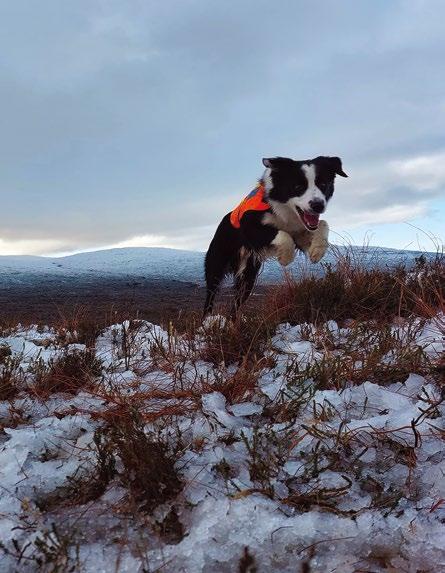
32,762
Hours of time given up by volunteers.
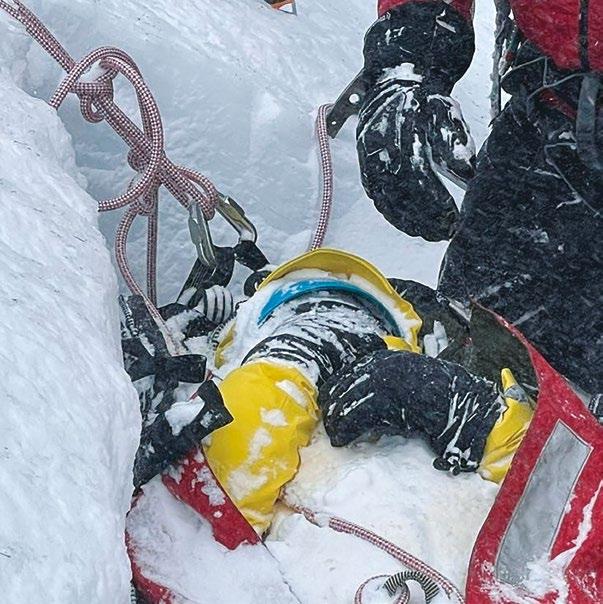
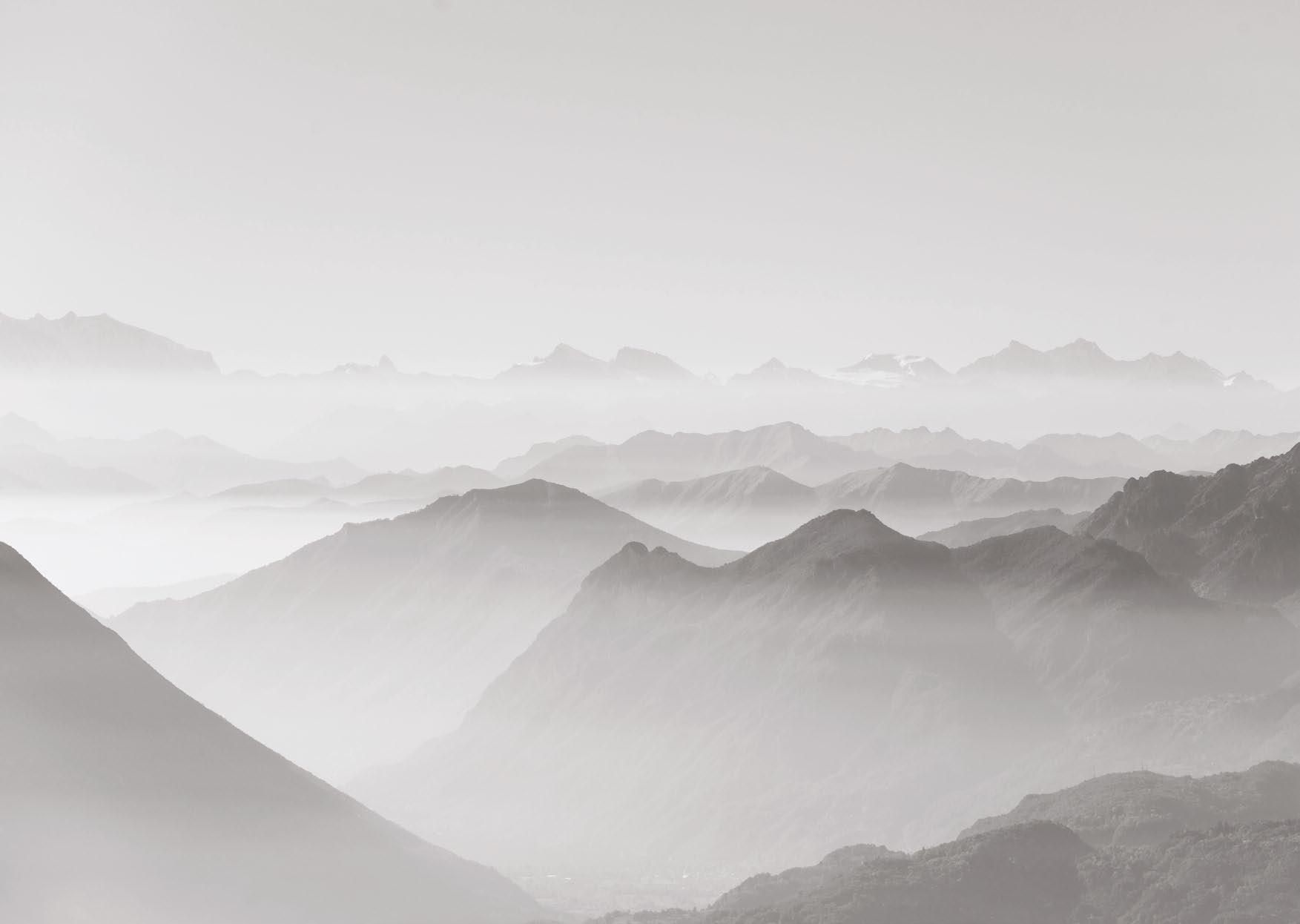
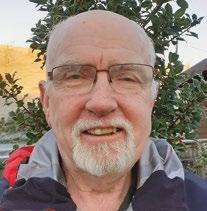
Bill Glennie, Scottish Mountain Rescue Chair
Last year Scottish Mountain Rescue member teams responded to 870 call-outs and helped 677 people. The Mountain Rescue Teams are there for people when they slip on rocky paths, when they get lost in bad weather and when serious and lifethreatening accidents happen in the outdoors. Many people don’t realise that the teams are also there for their communities. They help with searches for vulnerable missing people and when the emergency services need additional support with major incidents such as flooding or snowfall and in so many other scenarios.
The impact of this support is felt far beyond those who the teams directly help. It impacts the families and friends of those assisted, and everyone who knows them. Scottish Mountain Rescue Teams also provide a wider contribution to Scotland by encouraging community resilience and the way local people work together to help others; and in supporting the work of our economically vital tourism and outdoor recreation sectors, helping those businesses to flourish, especially in the more remote and rural areas of Scotland.
“Mountain Rescue volunteers rely on a huge network of people in their lives who help in different ways to make their volunteering possible. Volunteers can be called out at any time, and this means that the support of family and friends who sacrifice so much so that their loved ones can volunteer is vital.”
They also need the support of their employers, clients and colleagues to be able to balance volunteering with work commitments.
Rescues can be complex, and it often requires multiple services working together effectively for a successful outcome. Thank you to all those we work in partnership with including The Scottish Government , Police Scotland, Scottish Ambulance Service, Scottish Fire and Rescue Service, Bristow Helicopters Limited, Maritime and Coastguard Agency and Scottish Charity Air Ambulance.
Our member Mountain Rescue Teams have faced increased call-outs in recent years, attending around one third more rescues every year since the pandemic, seriously stretching their resources. We are facing a loss of funding as the UK Search and Rescue Training Fund, which previously funded a significant portion of team and national training is phased out. The support that Scottish Mountain Rescue and our member teams receive financially is vital and is needed now more than ever.
“We would like to say a very big thank you to
all the individuals, community groups, companies, and charitable trusts and to the Scottish Government who have supported us with donations and funding. Without you, the teams simply couldn’t do what
they do.”
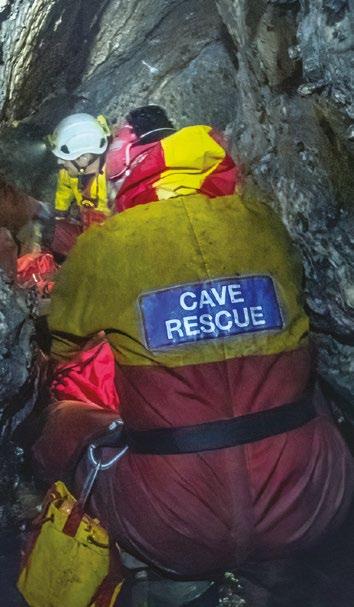

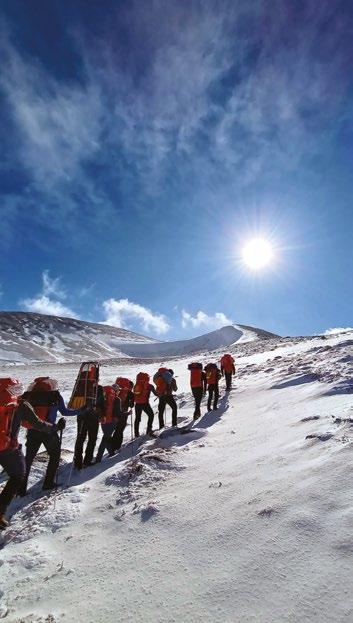
• To maintain the ability of Scottish Mountain Rescue affiliated teams to locate, assist and save the lives of people who are lost, injured, missing or otherwise in need of help in Scotland’s mountains and remote places.
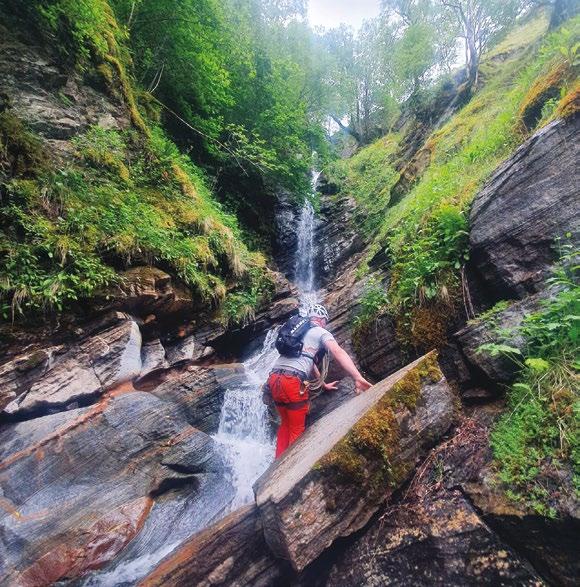
• To offer a world class, front line, voluntary search and rescue service capable of responding, individually or collectively, any hour, any day and in any weather condition.
• To work with other emergency responder organisations to assist our local communities in times of emergency.
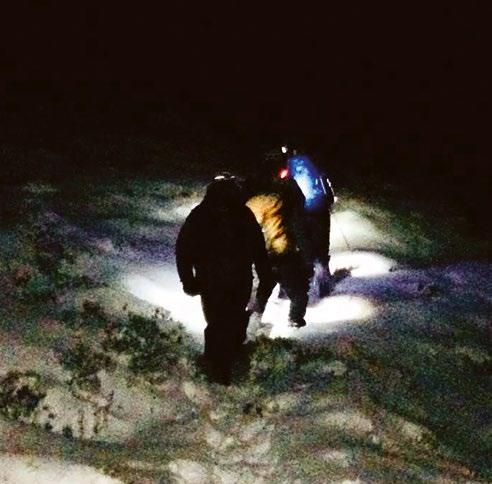
• Excellence – We strive to assist all of our members to achieve excellence in their search and rescue activities.
• Community – We strive to maintain a strong community of independent teams working collaboratively for the benefit of all.
• Engagement – We strive to engage positively with any person or organisation towards improving Search and Rescue capabilities in Scotland.
• Inclusivity – We endeavour to promote respect for all people equally, without bias, around differences of any kind.
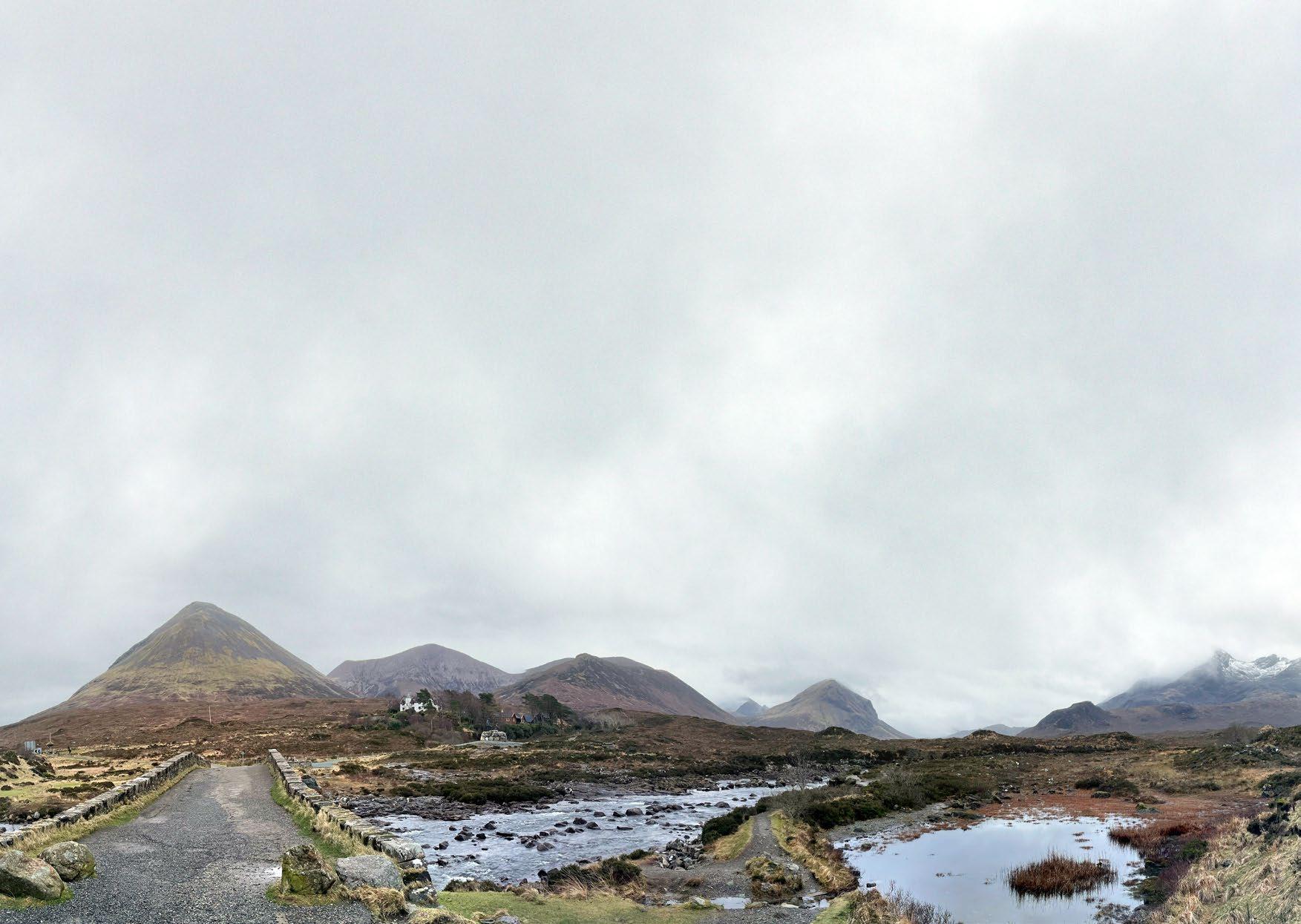
It was a very busy start to the year for Tayside MRT who responded to 15 Call-outs over the month. The team were deployed for many missing and overdue walkers, and assisted those who came into difficulty on the hills during particularly harsh winter conditions. Tayside went on to record their busiest ever year - with 95 Call-outs in 2023; a 72% increase on the previous year.
February saw Killin MRT attend multiple incidents in quick succession. “In just three days, our volunteers committed over 300 hours of service to Mountain Rescue”.
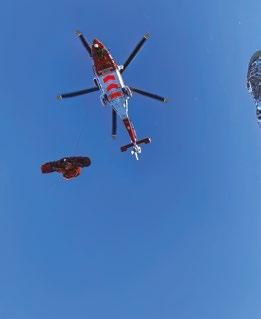
Arran MRT held a ‘How to Save a Life’ event at their base, inviting the local community to learn CPR and showing them how to use a public defibrillator.
The team were called out later in the month for a hill-runner who had fallen a significant distance from the ridge north of Goatfell. Though seriously injured, he was successfully treated by the team and flown to hospital with the assistance of Rescue helicopter 199. On the road to recovery by May, Doug and his friends took part in SMR’s annual fundraiser.
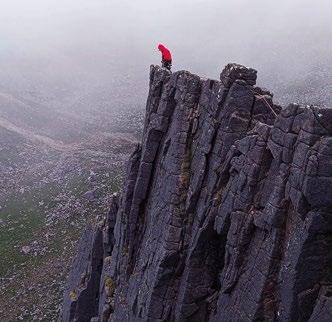
June brought the hottest month on record for Scotland, and MRTs were called to aid walkers with heat exhaustion. Galloway MRT and Ochils MRT were deployed alongside the Scottish Fire Service to assist with wildfires in their (respective) regions
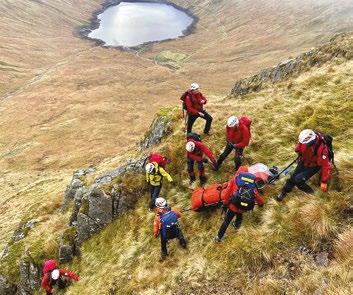
110 Mountain Rescue Team members from all over Scotland came together to attend the annual SMR Training Event in the Cairngorms. Volunteers had the opportunity to refresh their skills in 25 different training workshops over the weekend, from lightweight rigging to water awareness.
“I have always known that Scottish Mountain Rescue Teams provide an essential service but only now can I fully appreciate the incredible work that they do and the ongoing need to support SMR.”
Volunteers from Braemar MRT and Aberdeen MRT successfully rescued three climbers who had become crag-fast near Beinn a’Bhuird. Rescue helicopter 948 transported team members and equipment but it was still a long night for all involved.
The Scottish Cave Rescue Organisation (SCRO) had been in the middle of a joint training exercise with Ochils MRT, when they were called to a casualty in the Glen of Sorrow area. Tayside MRT volunteers also came to support the teams due to the length of the carry back down to the road.
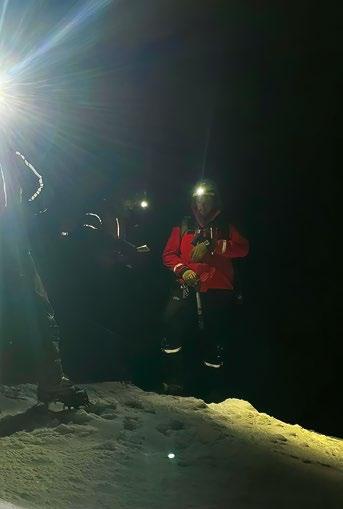
Just days after Rescue dog Rogue and her handler Paul of Braemar MRT passed their SARDA assessment, the pair made history by finding a missing hillwalker on their first official Call-out.
Hebrides MRT were delighted to open their first purpose-built base in Stornoway. The project was a massive success story; with the team managing to fundraise over £250,000 to build their base with the support of the local community and several major donors.

2023 UCI Cycling World Championships brought great excitement to Scotland in August. Tweed Valley MRT supported the mountain bike cross country marathon which ran through their area, as well as providing first aid cover with neighbouring Border Search and Rescue Unit and Moffat MRT.
Arrochar MRT were privileged to support the local primary school with their sponsored walk, inspiring a new generation of potential mountain rescuers!
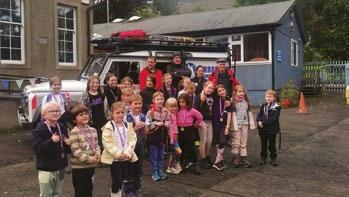
As the year closed, Dundonnell MRT were deployed along with two SARDA dogs to a fallen walker on Ben Wyvis. The team set out into deteriorating weather; braving high winds, blizzards and whiteout conditions to locate the casualty at the base of rough craggy ground. Helicopter extraction from here wasn’t possible, so the team faced a challenging belay of the casualty back up onto the ridge above, before stretchering them off the hill to the Rescue Helicopter 151. Standown at 03.30.
On Thursday 16th February, Dr John Pike, a GP from Bristol set out for a walk on the Isle of Skye from Sligachan to Loch Coruisk. Conditions were calm and clear, with just a little drizzle forecast for the afternoon, and John was keen to enjoy the last day of his holiday on Skye.
Most of the walk was at low level on a clear path, but to get to the remote loch, a high pass had to be crossed. Over the pass, the terrain quickly became pathless and challenging to navigate, with large outcrops of slick black rock littering the landscape. On one such rock, John lost his footing, falling hard on his left side and slamming his hip against the rock. He was immediately in an immense amount of pain and unable to put any weight on his left leg.
He realised the situation was pretty desperate, and tried to call emergency services but there was no signal. In an attempt to get signal, John hauled himself up on the rocks, scrambling as best he could to reach higher ground. Still unable to get any signal here, John rationalised that the owner of his B&B would raise the alarm the following morning when he failed to check out by 10.00am. There was nothing he could do, but weather a night on the open hillside where he was.
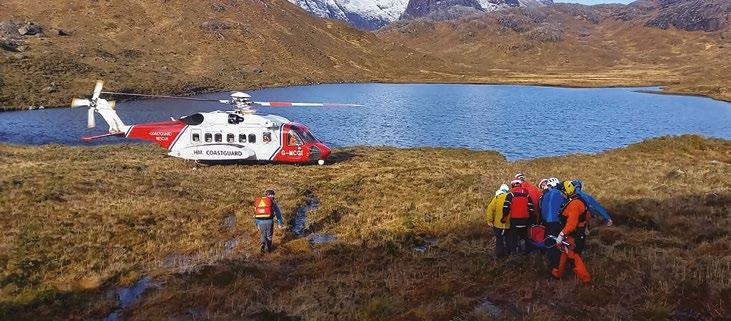
alarm. On Friday morning, Skye MRT leader Neil Urquhart got the call. After John’s car was found still parked at the start of his walk, Neil mobilised team members to start the search. A search and rescue (SARDA) dog based on Skye, Stornoway rescue helicopter 948 and later members of Kintail MRT came through to support the search.

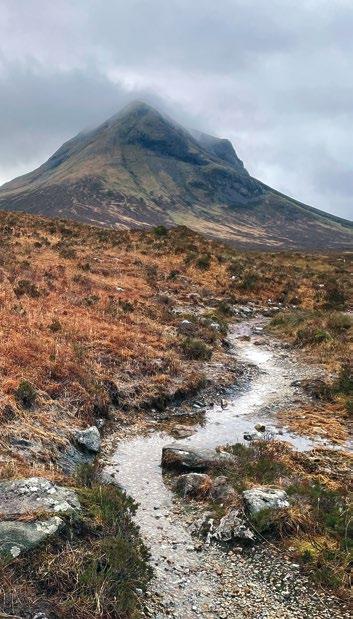
“I could not contact emergency services and it was February in the mountainous area. I realised I could die of hypothermia before they found me.”
To make matters even worse, a named storm was barrelling towards Skye. Storm Otto struck on Thursday night as John was huddled shivering above Loch Coruisk. Temperatures plummeted to around freezing, rain lashed the mountains, and winds of 95mph were recorded in nearby Elgol.
John recalls having to keep shaking himself at night to keep his body temperature from dropping dangerously low.
Meanwhile, in Portree, the owner of John’s B&B realised that John had not returned from his walk and raised the
With no idea of John’s route, the teams assumed that he might have headed onto the Cuillin mountains. Only at the end of the day of searching did they learn from John’s family, that he had actually headed to Loch Coruisk, far from their initial search area. The helicopter carried on searching until after dark but with no success.
Miraculously, John survived not just one, but two nights out in the open. Though the weather had improved on the Friday night, temperatures still dropped to around zero overnight and there was fresh snow on the hills come Saturday morning.
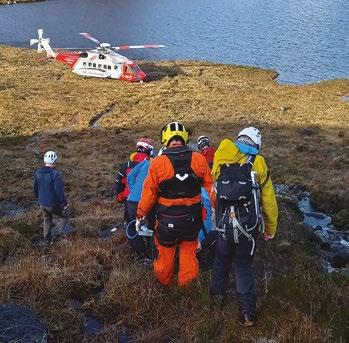
The rescue teams resumed the search early on Saturday morning, with Kintail MRT joining Skye MRT, SARDA, RAF & Police MRTs and Rescue helicopter 151 from Inverness joining forces in the search for John.
At around 10.25am on the Saturday, volunteers on the ground heard John’s whistle and spotted him on the hillside above the loch.
The team quickly set up a tent around John, and wrapped him up in a space blanket while he was assessed by the paramedic. With a body temperature of 34°C, John was hypothermic. He was stretchered the short way into the waiting helicopter and flown to Fort William for urgent hospital care.
Skye MRT leader Neil Urquhart said;
“Given that he wasn’t really prepared for nights out in the open, we were relieved and very surprised to find him alive”.
Against all chances, John survived. He had a hip replacement in Inverness, and has since returned to all his usual activities. John is incredibly grateful to all of the teams involved in his rescue;
“They were flawless, brilliant, awesome! They saved my life.”

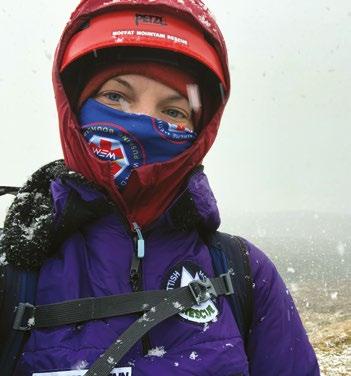 Laura Ene Moffat MRT
Laura Ene Moffat MRT
I have been a member of Moffat Mountain Rescue Team since 2020 joining the Callout list in 2021. Prior to this I was a probationary member of a neighbouring MRT however I transferred to the Moffat Team as the area covered was more appropriate for me to manage around my other commitments. I am one of the casualty carers in the team and as a medical doctor I also take responsibility for the ongoing training of the other casualty carers within the team.
I am a huge outdoor enthusiast with interests including climbing and winter sports (snowboarding, skiing and ice climbing).
“I
have always admired the work the rescue teams carried out and as a doctor with interests in extreme rural and event medicine I felt joining the Mountain Rescue was a good way for me to combine my medical skills with my outdoor passion whilst helping others.”
I think the hardest thing about being in the Mountain Rescue is the balance and commitment between work and volunteering. My job is challenging and it is long hours so committing time to attend training, particularly the additional training of casualty care and organising this training as well as callouts can be a lot to manage. As for the skills you learn as a volunteer, with enough time and training confidence grows therefore I wouldn’t say anything we learn as a team is too challenging.
What makes Mountain Rescue so rewarding is overcoming the challenges and obstacles you encounter along the way to get the best results in each task.
“As
a petite female from Romania I am not the typical person people think of when you say
‘Mountain Rescue’ therefore it’s also rewarding to be able to challenge attitudes and show what skills I can bring to a job no-one else can offer.”
I have gained friendships, experiences and skills I never thought I would have, that helped shape me as a person and I hope I can continue to change the perspective of others to give other minority groups the confidence to join. It feels amazing when we have a successful outcome at a callout. It’s very satisfying for all involved knowing we have supported that individual to get out of a sticky situation or located a missing person. It also offers members of the team an opportunity to put their skills and training into practice often in harsh and challenging conditions. Working together at callouts also help to bring the team closer together as we all share a common goal.
As a team we are lucky to have a lot of community support with a local garage funding our fuel costs and many local people taking part in our charity challenge to raise money for the team.
“My family and friends all know how important the Mountain Rescue Team is to me and fully support me in my journey within the team.”
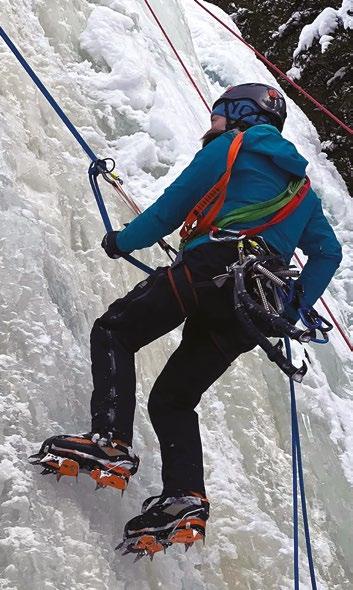
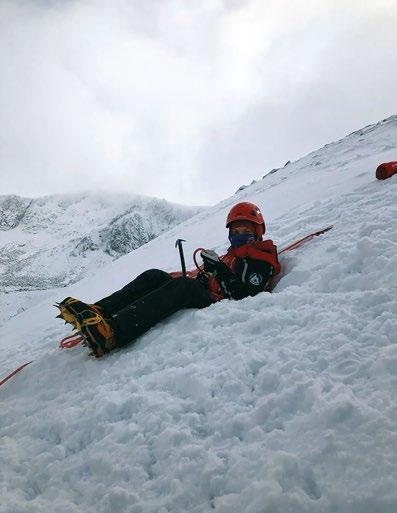
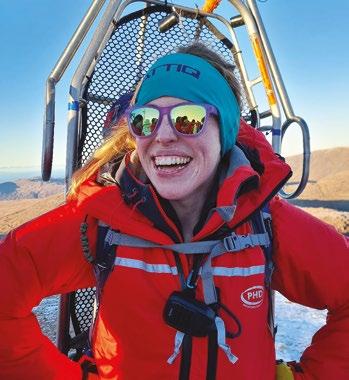 Nicola Jackson Torridon MRT
Nicola Jackson Torridon MRT
I am the Training Officer for Torridon Mountain Rescue Team and a Director in the committee. I have spent 10 years rigging up ropes, carrying stretchers up mountains and hanging out with our amazing team in various cold and wet situations.
As someone who loves spending time in the mountains, I decided that offering my time to the incredible organisation that is Scottish Mountain Rescue would be both a rewarding and highly valuable thing to do. A friend of mine in the Torridon team suggested I joined, and I am so glad I did!
“The most rewarding thing about being in a mountain rescue team is building an effective team that can help you and others in many situations.”
It is great having a group of friends who you trust to hold the rope when being lowered down a rock face, who will help you out when you forget your snacks on a callout, who will get up in the dark and run over a mountain with you before training, who immediately say yes to jumping in cold lochs for fun and who will always be up for going on climbing holidays.
“On the flip side, the hardest thing... Nothing, I love it! Well, I suppose I should write something here about operating in difficult weather conditions, but I really like that part. Or maybe getting called out in the early hours, but I would rather be on a mountain than sleeping.”
Being in a Mountain Rescue Team is a big commitment. The more time you commit, then the more you get out of it and the more we can work effectively as a team. We train the first Sunday of every month, with additional evening training and full weekends to build further skills from rigging, to first aid and swift water rescue.
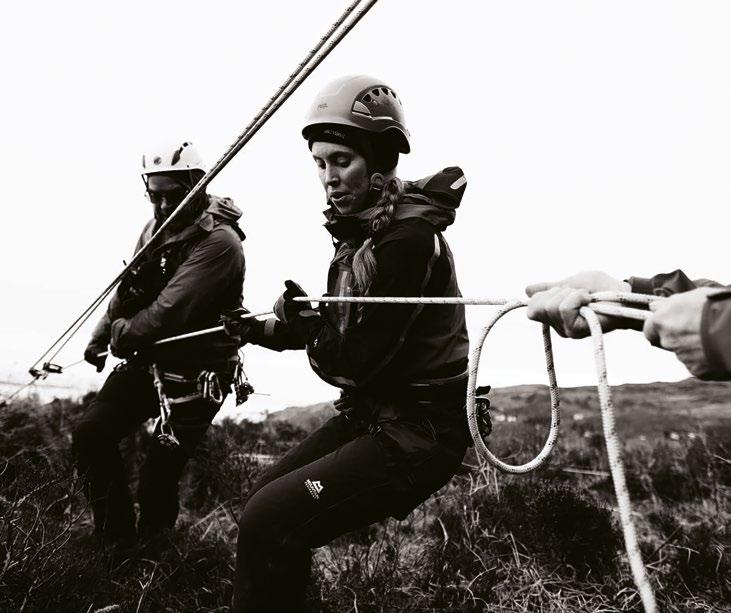
“When a call out goes well and there is a successful outcome for the casualty, it can still mean that we have dealt with a difficult situation. Our team are supportive in these situations.”
The wider support we receive is very important as well. When not in the mountains, I work as a Net Zero lead in UK wide construction business. I am grateful to the company I work for; they understand the need for search and rescue and the valuable service we provide as volunteers. The company permits several days per year for me to attend callouts and training where required.

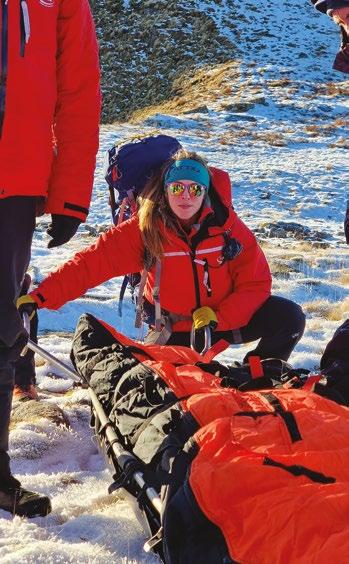
SMR provides National Training in 10 different disciplines: Rigging; Cas Care; Search Management; Incident Management; Digital Mapping; PPE; 4 x 4; Water Awareness; Avalanche; Wellbeing including certified Mental Health First Aid.
These Courses are held in various locations around the Country to maximise the numbers on each Course. Courses are released on a yearly basis and are bookable online.
20 National Courses with 371 attendees were completed throughout 2022/23, culminating with the National Training Event which was attended by 85 people from Teams throughout Scotland. All Courses have been developed by the relevant Working Groups and are tailored to the needs of Scottish Mountain Rescue, whilst adhering to ICAR (International Commission on Alpine Rescue) recommendations. The majority are staffed by Team Members, teaching Mountain Rescue Skills to other Mountain Rescuers.
We are currently developing a “standalone” Training website which will include Course description; pre-Course reading; learning materials including videos; the ability to book Courses; and a Forum for any questions relating to specific topics.
These Courses cost approximately £150,000 to run per annum. For the past decade or so, funding has come from the Charities Aid Foundation (CAF) either in full, or as a percentage. This funding came from the LIBOR Banking scandal. However, this funding is being phased out and coming to an end in 2026, and we are seeking alternative funding for the future.
National Training is extremely important in terms of providing Team Members with gold standard best practice, with the best Training available. This National Training is then taken back locally and disseminated resulting in more Team Members being trained, therefore, skill and knowledge levels increase exponentially.
Paul Russell Scottish Mountain Rescue Training Officer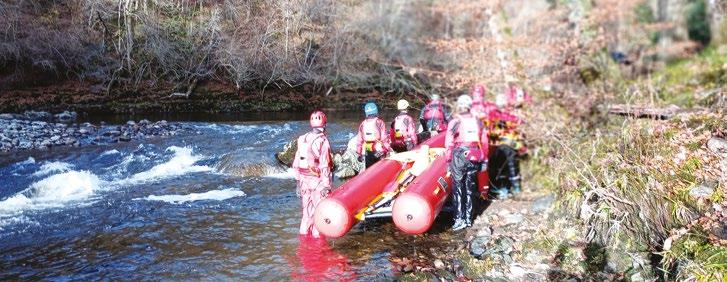
One example of the training courses that we run is Casualty Care.
In mountain rescue circles the term ‘casualty care’ usually refers to the exam that individuals can take which allows them to be able to assess, treat and use prescription only drugs on unwell and injured casualties. This privilege is unique to mountain rescue probably worldwide, where MRT volunteers can administer drugs that would normally require a healthcare professional. The exemption in law is allowed due to the fact mountain rescue are often the only emergency service who can get to casualties in these remote locations.
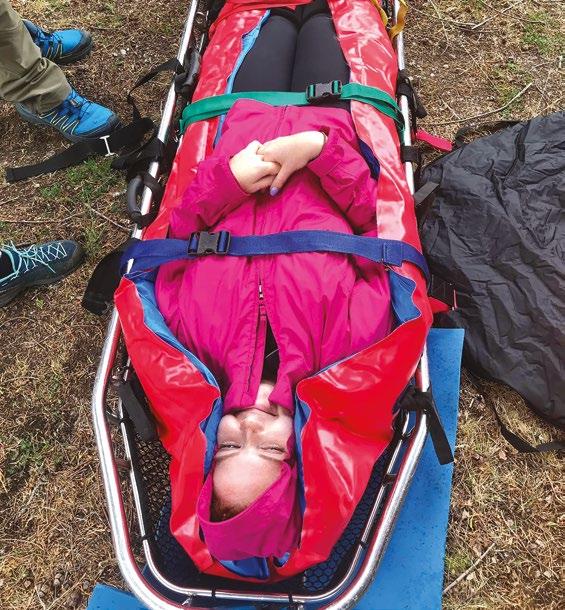
Safety and governance for casualties is paramount, and rescuers go through many months or years of training before qualifying as a casualty carer. Every member of a mountain rescue team is trained in first aid, then a few committed individuals train to this advanced level, accessing a list of drugs which is similar to those an ambulance technician can administer with the addition of controlled drugs such as morphine and fentanyl, vital for pain relief. The certificate lasts for 3 years and requires yearly ongoing training.
SMR run both training courses and facilitate the exam for rescuers to be certified to use drugs in the mountain rescue environment. In the last 7 years the training has been revamped and rather than just offering an exam, we have an updated syllabus for study, an on-line training portal, in person weekend training courses along with the exam administration. I hold an opiate licence with the UK home office and issue orders for all prescription drugs held by teams, but remain legally responsible for all prescription drugs held by teams.
The casualty core qualification has just been renamed ‘Remote Rescue Technician’ allowing recognition outside of the mountain rescue world.
Dr Alastair Glennie National MedicalOfficer

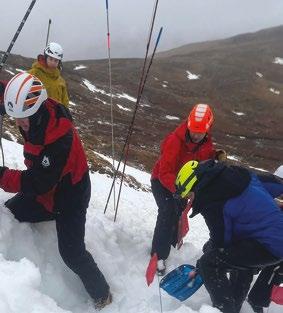
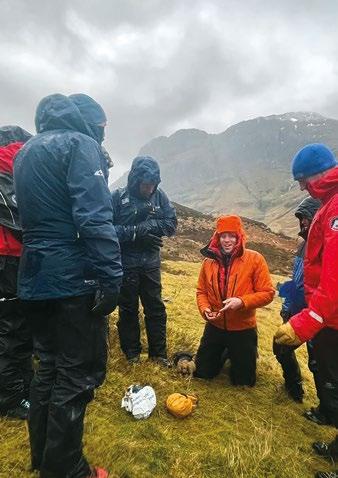
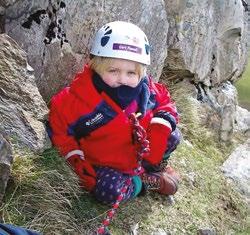
The family and friends of volunteers all play a vital part in supporting Mountain Rescue Volunteers, without the network of support behind our volunteers, they simply could not do what they do. We share a few different perspectives from family members of Mountain Rescue volunteers. Everybody’s support network and ‘family’ will be different, and there are also a diverse range of experiences amongst friends and family members, so these just represent a few of those experiences.
Ceri, daughter of Damon Oban Mountain Rescue Team
Growing up with my dad in mountain rescue was incredibly rewarding for me. I understood that he was going out to save lives and I thought that was amazing. I spent a lot of time helping with fundraisers, whether that be sponsored walks or helping at highland shows where there was a great atmosphere among the team and families.
There were times when it was harder, for example we were just sitting down to the village quiz when he got called out and had to leave. There have also been several occasions when mid meal he would be called out and we would all have to stop and help him get out the door. But in general, it was never really an issue and we were happy that he was able to go.
His association with mountain rescue allowed me to be exposed to medicine, especially in the outdoors. It was definitely one of the factors that has led to me studying medicine. I know that when I am qualified I will likely join a team myself, having seen my dad working with them my whole life and my mum has just joined too and wanting to contribute myself.
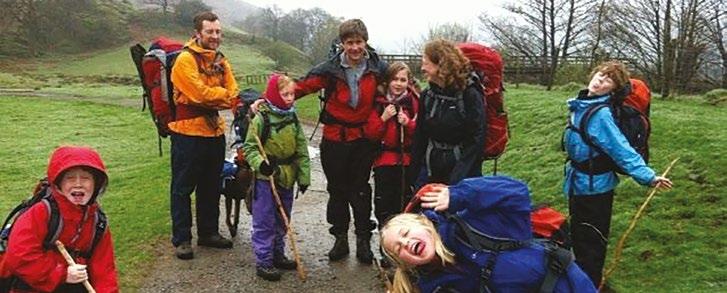

I always felt there was a strong sense of community in the team, with other members being good friends of our family. We would go along to the Christmas dinners and meet other kids in the team.
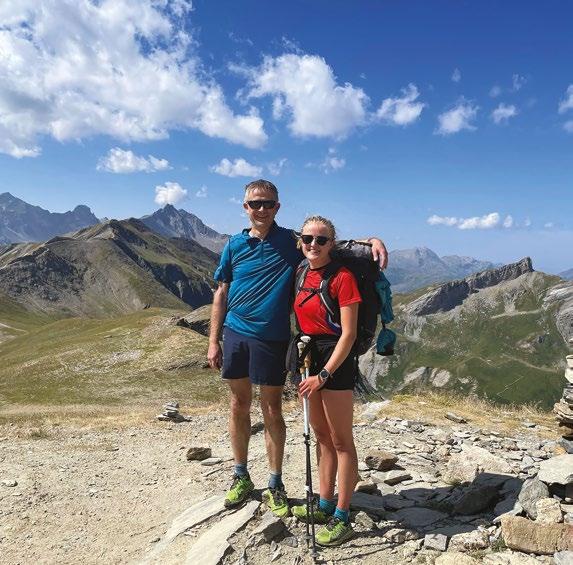
I’m a mountaineer, engineer and parent to two kids aged 1 and 4 years old. My husband, Jonnie, could be described in the same way plus as a mountain rescue volunteer. Jonnie has been in the team for about 5 years. In his team they are on call 24/7 as well as one planned training day a month and they can be big days or multi days into very remote places. Having a young family, it’s easy to feel tied to the house. For Jonnie training, and to a lesser extent, call outs, are a good opportunity to get out into the hills to get some exercise. Being relatively new to the area the team has widened our network so it helps me feel more at home here.
The hardest part for me is being left at a moments notice, literally holding the baby. I’m scrambling to make dinner with our young kids hanging off me or another time entertaining the in-laws on my own. One of the worst timings for a call out happened when I was just leaving with our 4 year old to take her ice skating for the first time. We hadn’t had enough mum/daughter time for a while and the skating was all pre-booked and she was so excited.
As a mountaineer myself I know that things can take unexpected turns in the hills no matter how prepared you are so I am willing to pick up the slack at home so that Jonnie can go and assist. I think it’s too easy for the public to overlook the volunteer aspect of their role. They are not on shift, they are a parent, climbing partner or colleague.
Noah at 11 yrs, son of Christine Tweed Valley Mountain Rescue Team
“Mountain rescue is about my mum going away and rescuing people off the hill every so often. It’s a good thing for mum to do and it doesn’t bother me when she goes out although sometimes if she wakes me up in the middle of the night because she has been called out it is quite annoying. If she has been out a long time and is a bit tired when she gets back I give her a hug and some of my chocolate”.
Partners and family of Mountain Rescue volunteers are not recognised as giving up their time selflessly like Mountain Rescue members, and are a critical part of the teams. We do not thank them enough for their support of each rescue. We would like to say a huge thank you to all the family and friends of our volunteers for all they do to support our volunteers.
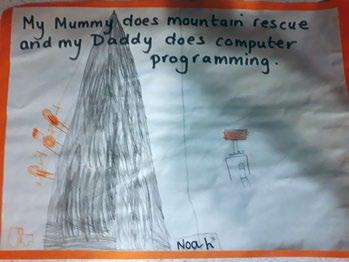
Everyone that supports Scottish Mountain Rescue and our member teams is a life saver. Whether you donate, fundraise or have left a gift in your will. You help our teams to be there when the call-out comes in.
With teams facing increased call-outs in recent years, and having to stretch their resources further, this support is appreciated now more than ever.
We hope you know what a difference you make to Scottish Mountain Rescue and our member teams. Thank you for everything you do.
“I
am very mindful that people who choose to help Mountain Rescue, whether financially or in some other way, have a choice. I am grateful to all our supporters for the help and support they provide, particularly as we increasingly rely on them to help us build the capability and resilience we need. This support is critical and helps us to continue to provide our life saving services. It is support that is never taken for granted and for which we have a real sense of gratitude”
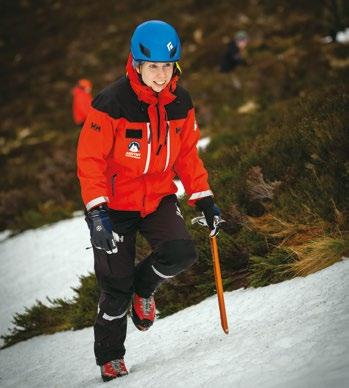
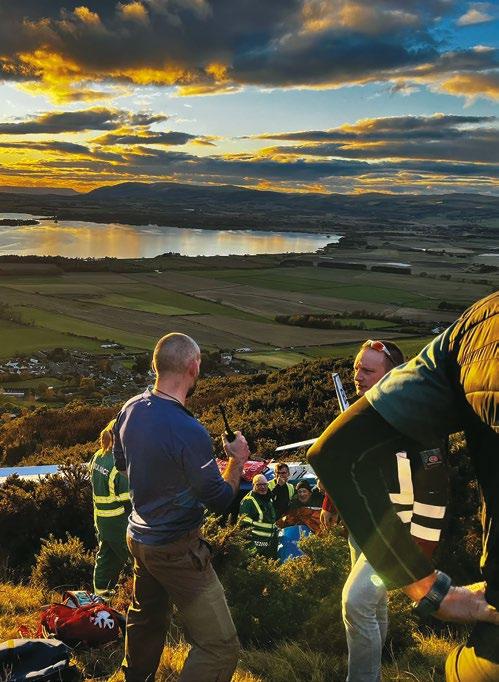 Gary Butler Dundonnell Mountain Rescue Team
Gary Butler Dundonnell Mountain Rescue Team
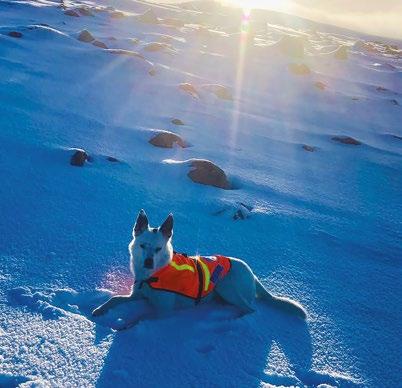
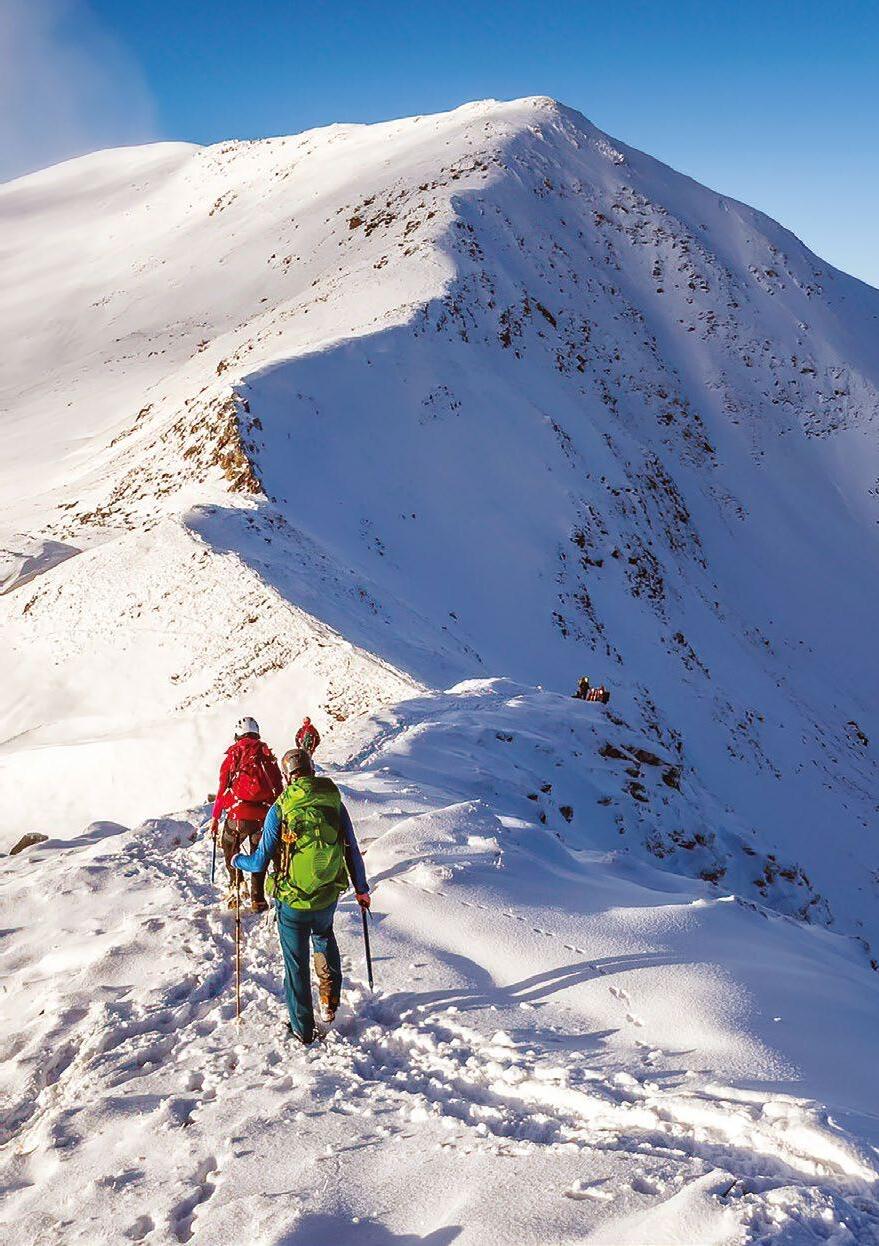

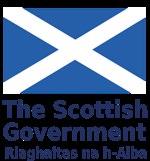
We want to express our gratitude to the Scottish Government for their continued support of Scottish Mountain Rescue.
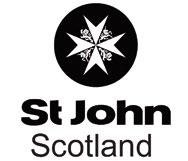
St John Scotland (SJS) have been a long-standing supporter of MRTs in Scotland. They have generously given over £3.75 million in funding, mainly through the provision of bases and vehicles, but also made a significant contribution towards the purchase of new radios in 2019, helping MRTs to save lives.
We would like to say a big thank you for the continued support of St John Scotland. In return our teams are increasingly assisting St John Scotland with its work in taking public access defibrillators and CPR training to their communities, and we look forward to finding ways to continue to work together and support each other in future.
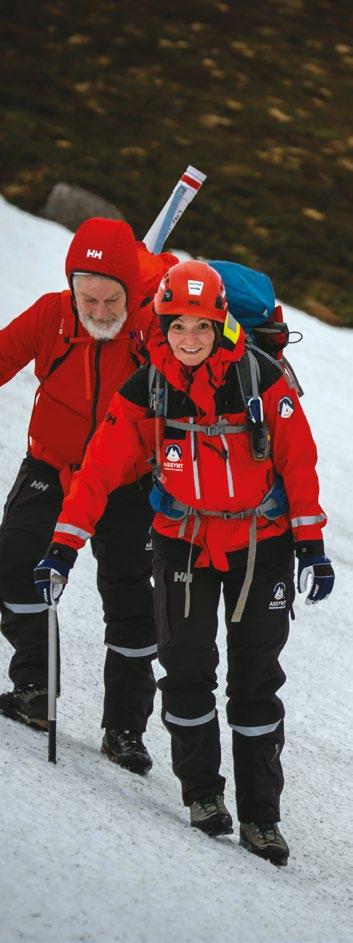
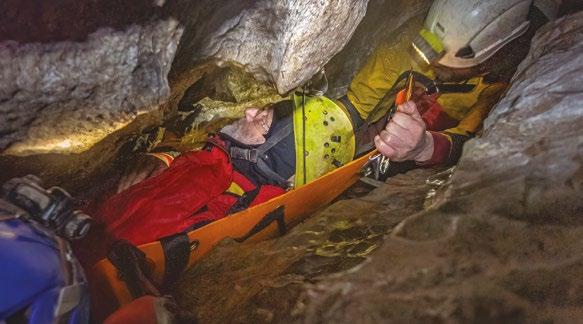

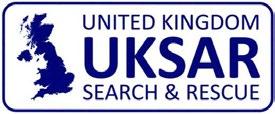
The JD Foundation is a registered charity founded by JD Sports Fashion PLC in December 2015. There are currently 21 charities supported by the JD Foundation, two of which are the environmental charities, Scottish Mountain Rescue and Mountain Rescue England and Wales.
As an international multichannel retailer of sports fashion and outdoors brands, the JD Group includes leading outdoor retailers Blacks, Millets, Tiso and Ultimate Outdoors. Therefore, the JD Foundation has been delighted to support Scottish Mountain Rescue and Mountain Rescue England and Wales through money raised on the sale of carrier bags across its stores in Scotland, England and Wales. The way that JD Foundation support charities will be changing in 2024, so we will no longer receive funding in the same way, but we are looking forward to continue to work together.
Since its launch the JD Foundation has donated over £200,000 to Scottish Mountain Rescue to support the teams and their invaluable work saving lives in the outdoors.
Finally we would like to thank the UKSAR Training Fund administered by the Charities Aid Foundation for supporting the national training programme offered by SMR.
JANUARY

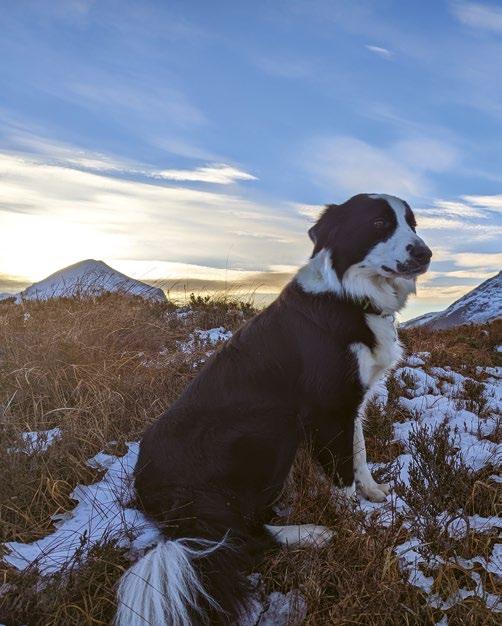
There are lots of different ways you can support SMR or your local MRT including:
• Make a one-off donation
• Set up a regular donation
• Volunteer your time
• Leave a gift in your will
• Fundraise
We’re a vital free service for anyone who uses the outdoors in Scotland but we rely on donations to fund three out of every five rescues, so our work simply wouldn’t be possible without you. Gifts in wills are an increasingly important way to support us, funding around 100 rescues every year!
www.scottishmountainrescue.org/support fundraising@scottishmountainrescue.org 07846 653000
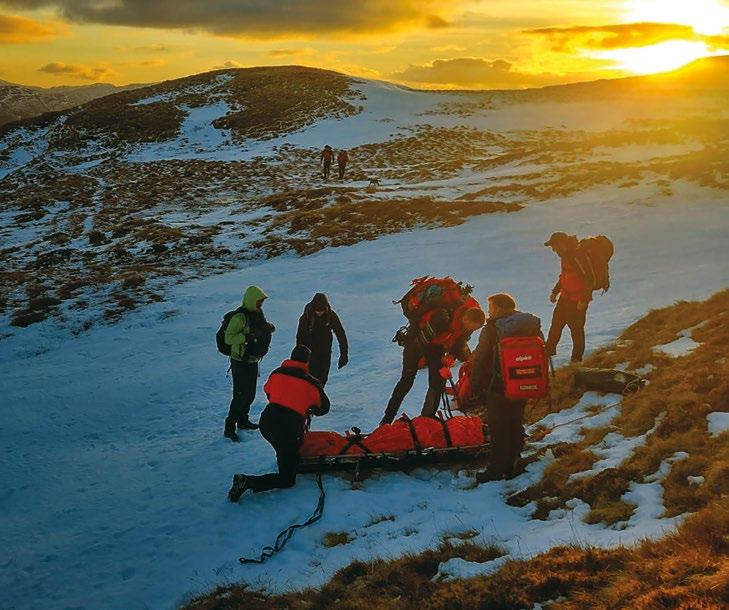

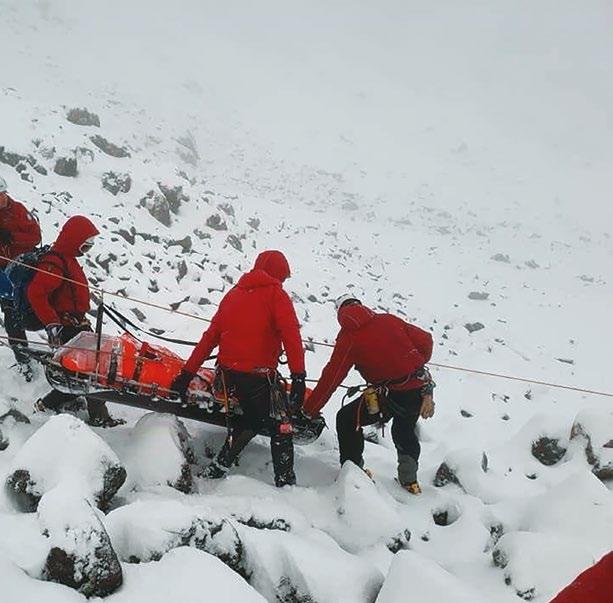
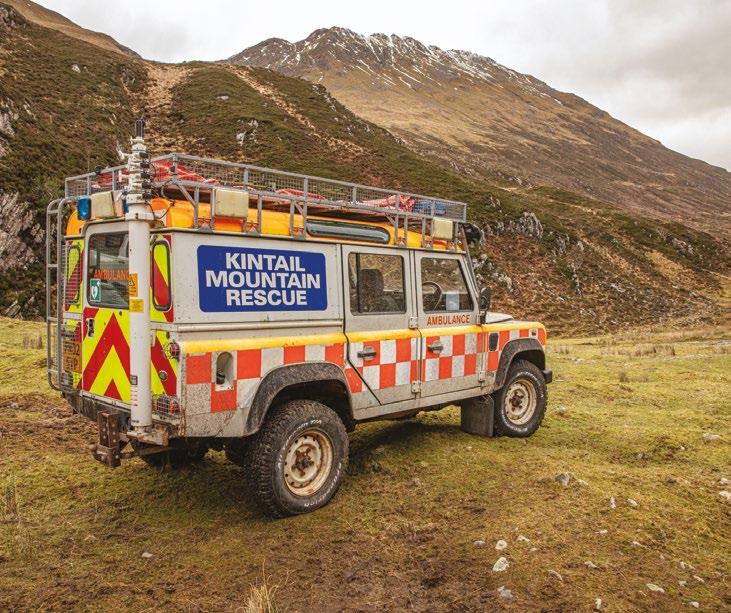
SMR represents these teams and their contact information can be found on scottishmountainrescue.org
Aberdeen MRT
Arran MRT
Arrochar MRT
Assynt MRT
Borders Search and Rescue Unit
Braemar MRT
Dundonnell MRT
Galloway MRT
Glenelg MRT
Glenmore Lodge MRT
Hebrides MRT
Killin MRT
Kintail MRT
Lomond MRT
Moffat MRT
Oban MRT
Ochils MRT
SARDA (Scotland)
SARDA (Southern Scotland)
Search & Rescue Aerial Association
Scotland
Scottish Cave Rescue Organisation
Skye MRT
Tayside MRT
Torridon MRT
Tweed Valley MRT
Police Scotland (Grampian) MRT
Police Scotland (Strathclyde) MRT
Police Scotland (Tayside) MRT
RAF Lossiemouth MRT
SMR works in partnership with –
The Scottish Government
Police Scotland
Scottish Ambulance Service
Scottish Fire and Rescue Service
Bristow Helicopters Limited
Maritime and Coastguard Agency
The Home Office
Scottish Charity Air Ambulance
Scottish Mountain Rescue
Glenmore Lodge
Glenmore
Aviemore
Inverness-shire
PH22 1QZ
info@scottishmountainrescue.org
01479 861 370 www.scottishmountainrescue.org
@scottishmountainrescue
@ScottishMR
@scottishmountainrescue
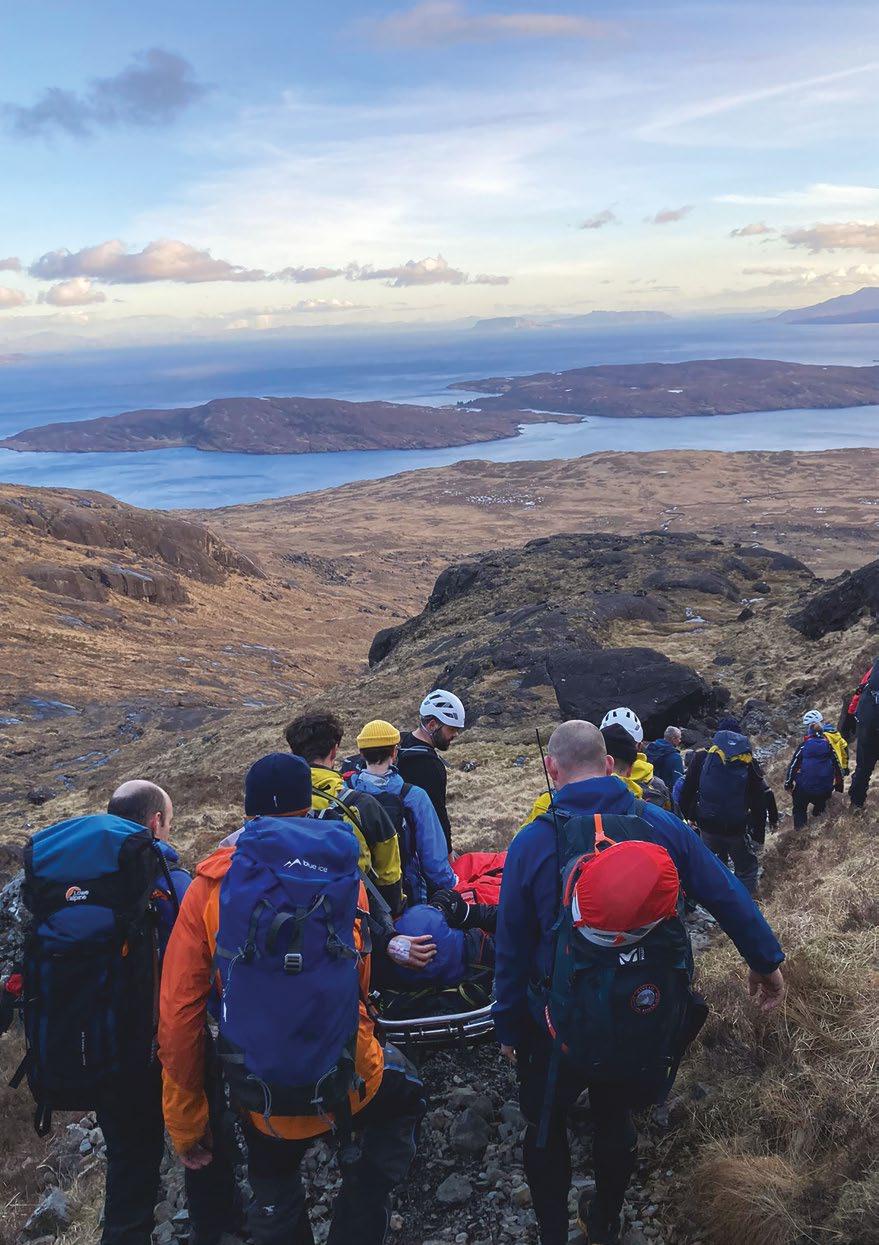
Volunteering